沪教牛津版八年级下unit2bodylanguage(可编辑修改word版)
英语八年级下册牛津版Unit 2 Body language
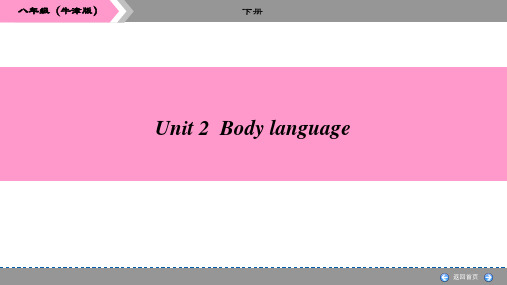
返回首页
八年级(牛津版)
下册
16.一会儿后 aaffeewwmmoommeennttssllaatteerr 17.决定做某事 dedceicdiedetotododostsht.h. 18.感觉受欢迎 ffeeeellwweellccoommee 19.高兴地向某人打招呼 gigvievesbsb. a. achcheeerefruful gl rgereeteitningg 20.对某人笑 ssmmiilleeaattssbb. .
返回首页
八年级(牛津版)
下册
6.给某人一个好印象 mmБайду номын сангаасkaekea agogoododimimprpersessisoinonononsbs.b. 7.抬着头 hhooldldoonnee’s’shheeaadduupp 8.将头转向某人 tuturnrnoonne’es’shheaeaddtotowwaardrdsssbsb. . 9.提醒某人某事 rermeminidndsbs.ba. baobuotusttsht.h. 10.使某人想起某事 rermemininddsbsb. o. fofstshth. .
返回首页
八年级(牛津版)
18.以后;后来 adv.
下册
llaatteerr
19.提醒 v. rreemminindd
20.颈;脖子 n. nneecckk
21.使交叉 v. ccrroossss
22.点头 v. nnoodd
23.摇头;握手 v. sshhaakkee
24.确信;肯定 adj. ssuurree
返回首页
八年级(牛津版)
下册
3.你没有给人们留下好的印象。(give sb. a good impression/make
牛津版八年级下英语unit2body language

Ballet is a special form of art, it's a Franch word. It mesns "to dance". There's no talking or singing in ballet. One of the most famous ballets in the world is Swan Lake
whole apperance communicates
things.
Stop
crossing his arms
→
angry
resting her head on her hand
→
bored
shaking his head
→
No/I don't know/care
shaking hands
clap one's hands
→
welcome
Unit2 Body language
By Miss Li
Body language
It is the way you stand and sit.
It's you gesture and the expression on your face . You
信息消息receiveamessagefromsb收到某人的来信takeamessagefortosb捎口信给某人europeeropeanbodylaguagewestern15thfamouswingslongnecksearlybodiessummary?crossonesarms手臂交叉shakehands握手?nodoneshead点头shakeoneshead摇头?closeoneseyes闭眼?restyourheadonyourhand用手托着头?europe欧洲european欧洲人欧洲的?expression表情神色?message信息消息?receiveamessagefromsb收到某人的来信?takeamessagefortosb为某人捎口信groupworkrules
沪教牛津版八年级下册英语 Unit 2 1- Reading 教案

Unit 2 Body language教案课题: Unit 2 Body language课时: 第 1 课时,共 4 课时课型:Reading教学目标:知识目标1. Students can use skimming and scanning to get the main idea of the reading and some details .2. Students can grasp key words and sentences.3. Students get to know how to use words to form sentences.能力目标To improve the ability of reading.To do the practice themselves.To learn the usage of words and phrases.情感目标To learn how to use body language correctly and behave politely .To learn the importance of body language and the differences between various cultures.教学重点: Get the main idea of the reading.教学难点: Key words and sentences教学步骤:Step 1.Warm up.1.Ask questions by showing pictures(通过图片展示,以问答的方式展开).T: Ask: Look at the pictures and answer the questions.Ss: ……..T: The way one acts and behaves is important. It can show different feeling. When communicating with others, we should pay much attention to our body language ,which can convey hidden things to others.(总结概括)Step 2. Lead –inShow different pictures to do ask and answer practice.T: Do you know the meanings of the following gestures ?Ss: …….T: Do you know the meanings of the following facial expressions?Ss: …….Step 3 PresentationReadingPart A.A1:What do you know about ……?.(展示课件,进行问答连线)Part B Before you read.Look at the picture, the title and the introduction to the story on page 19. Then answer the questions below.T:this part is to practice your ability of skimming , scanning and guessing. (展示课件,提醒学生速读时把握关键点)Listen to the passage and answer the questionsT: Listen to the reading .(展示问题,利用Reading练习听力,一举两得)Part CV ocabularyC1 T:Let’s revise vocabulary and try to guess which words or phrases in the reading have similar meanings to the words below. .(展示课件并通过实例讲解做题的技巧,边提示边练习)C2: T:Complete their conversation with the words from the box.(展示课件,问答,提醒学生注意使用正确的形式)StrategyIdentifying the speaker(展示课件,利用Reading中的例句引导,并提醒学生注意标点符号)Part DComprehensionD1 Simon is talking to a friend on the phone. Read the story on P19 and complete his words with the information from the story.(展示课件,边问边答)D2 Read the story again and answer the questions below in complete sentences. T: D2 are mainly about how much you have learned about the reading. Let’s have a check.(利用课件进行问答)D3 Group workIn pairs ,discuss what your classmate’s body language is saying about him/her . Offer two questions to help them.And ask them to report y result to the whole class. Let’s see which group is the best! (让学生问题为话题,展开讨论。
沪教牛津版八年级下-unit-2-body-language

沪教牛津版八年级下-unit-2-body-languageUnit 2 Body language一、重点词汇:(一)根据汉语提示完成句子。
1. He made a rude _gesture (手势) at the driver of the other car.2. There is no advice on how to use your body language (肢体语言).3. When he heard the words, he gave a long sigh (叹气).4. There is a sad expression(表情) on her face.5. She gives the impression (印象) of being very busy.6. She sat with her back towards (朝向) me.7. Hold (使保持) your head up.8. I walked over to (朝……走过去) her and put out my hand.9. Can you come over to ( 顺便来) our school tomorrow?10. The young man made a good impression on (给留下好印象) them.11. The horse were running neck and neck .(齐头并进,不分上下).12. Don’t cross (交叉) your legs when you sit, please.Cross 作动词,意为“穿过,越过,渡过”,可直接带宾语。
Across介词,指从这边到那边平面“通过,横过”,含义与on有关。
He walked across the road to the other side.13. What a hot day! I am a bit (有点儿) thirsty. 相当于a little 或kind of,用来修饰形容词或副词。
广州沪教牛津版八年级英语下册 Unit 2 Body language 单元检测卷(含答案)
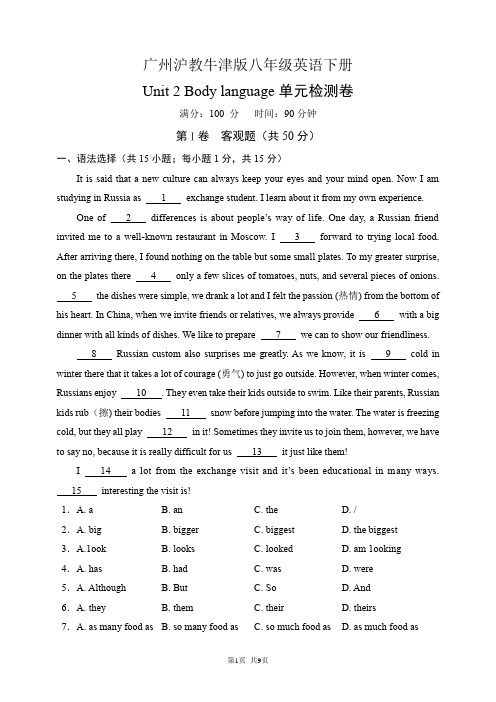
广州沪教牛津版八年级英语下册Unit 2 Body language单元检测卷满分:100 分时间:90分钟第Ⅰ卷客观题(共50分)一、语法选择(共15小题;每小题1分,共15分)It is said that a new culture can always keep your eyes and your mind open. Now I am studying in Russia as 1 exchange student. I learn about it from my own experience.One of 2 differences is about people’s way of life. One day, a Russian friend invited me to a well-known restaurant in Moscow. I 3 forward to trying local food. After arriving there, I found nothing on the table but some small plates. To my greater surprise, on the plates there 4 only a few slices of tomatoes, nuts, and several pieces of onions.5 the dishes were simple, we drank a lot and I felt the passion (热情) from the bottom of his heart. In China, when we invite friends or relatives, we always provide6 with a big dinner with all kinds of dishes. We like to prepare7 we can to show our friendliness.8 Russian custom also surprises me greatly. As we know, it is 9 cold in winter there that it takes a lot of courage (勇气) to just go outside. However, when winter comes, Russians enjoy 10 . They even take their kids outside to swim. Like their parents, Russian kids rub(擦) their bodies 11 snow before jumping into the water. The water is freezing cold, but they all play 12 in it! Sometimes they invite us to join them, however, we have to say no, because it is really difficult for us 13 it just like them!I 14 a lot from the exchange visit and it’s been educational in many ways.15 interesting the visit is!1.A. a B. an C. the D. /2.A. big B. bigger C. biggest D. the biggest3.A.1ook B. looks C. looked D. am 1ooking4.A. has B. had C. was D. were5.A. Although B. But C. So D. And6.A. they B. them C. their D. theirs7.A. as many food as B. so many food as C. so much food as D. as much food as8.A. Another B. Other C. The other D. The others9.A. very B. quite C. so D. such10.A. swim B. swam C. to swim D. swimming11.A. with B. by C. in D. through12.A. excited B. excitedly C. excite D. excitement 13.A. enjoy B. enjoyed C. to enjoy D. enjoying14.A.1earn B.1earnt C. will 1earn D. have 1earnt 15.A. How B. How an C. What D. What an二、完形填空(共10分;每小题1分,共10分)High school does not encourage students to know about the new things in life,but college sets the stage for it. I myself went through this 16 process (过程) and found something that has changed my experience at college for the better: I discovered ASL﹣American Sign Language.I never felt it necessary to learn any sign language before. All of my family members can hear, and so are all my friends. The 17 language was enough. Little by little, I discovered my 18 for ASL.The 19 began during my first week at college. I watched it carefully when the ASL club performed their translation of a song. Both the hand movements and the idea of communicating without speaking attracted me. What I saw was completely different from anything I had experienced in the past. This new form of communication just made me want more.After that, feeling the need to 20 further, I decided to join one of ASL clubs. I only learned how to 21 my feelings with my hands about the letters that day. Although my process was 22 , I wasn’t disappointed about it. I then tried my best to take part in those club’s meetings and learned all I could.The following term, I decided to be a member of an ASL class. The professor was deaf and any talking wasn’t 23 . I soon realized that silence was not unpleasant. 24 , if there had been any talking, it would have caused to learn less. Now, I enjoy the silence and the25 way of communication.16.A. talking B. planning C. searching D. looking17.A. body B. spoken C. written D. foreign18.A. love B. question C. need D. goal19.A. map B. trip C. story D. task20.A. ask about B. know about C. worry about D. talk about21.A. explain B. experience C. experiment D. express22.A. ready B. slow C. common D. nervous23.A. allowed B. welcomed C. turned D. repeated24.A. Finally B. Besides C. Instead D. However25.A. easy B. popular C. new D. quick三、阅读(共两节,满分25分)第一节阅读理解(共10小题;每小题2分,满分20分)AHannay was nervous. His enemies were searching for him. All around him were grassy hills without t rees. He had nowhere to hide. How could he escape?Hannay walked along the country for a long time. Then he saw a road worker, who was working alone, fixing the road. Hannay could see the road worker was not feeling well. Hannay came up to him and said “How are you?”“My head hurts,” the worker said, “I can’t do it. I want to go home to bed. My daughter got married yesterday, and I drank a lot of wine with my friends. That’s the problem!”Hannay agreed that he should be home in bed.“Yes, and I would be,” he replied,” but yesterday I received a message saying that the new surveyor was coming to look at my work. If he comes and finds me away, I’ll be in trouble.”Suddenly Hannay had a bright idea--he could act as the road worker and get away from his enemies.“You go off to bed,” Hannay said, “I’ll do your job until the new surveyor comes.”The road worker was pleased with this idea. He gave Hannay his hat and his old coat. Then he went home to sleep and perhaps to drink a bit more. Hannay put on the worker’s hat and coat and began to fix the road. About an hour later he heard a voice.“Are you the road worker?” it asked.It was the new surveyor. He was a young man with a clean face. He sat in a small car.Hannay said yes. The surveyor told him about some work he wanted him to do before he came by again and drove off. Hannay continued with his work.Then a village boy came by. “What has happened to the road worker?” he asked.“He stayed at home today,” Hannay replied. “He’s sick.”At about midday, a large car came down the hill and stopped near Hannay. Three man got out of the car. Hannay’s heart beat fast. He knew his enemies were coming...26.What is this passage probably taken from?A. A history book.B. A travel book.C. A novelD. A science book.27.Why was the road worker feeling ill?A. He had a cold.B. He hadn’t eaten all day.C. He had been working all day.D. He drank too much at his daughter’s wedding. 28.Who did NOT come by while Hannay was working on the road?A. The surveyor.B. The road worker’s daughter.C. Hannay’s enemies.D. A village boy.29.What can we infer (推断) from the story?A. Hannay helped the road worker because he was warm-hearted.B. The grassy hills were a perfect hiding place for Hannay.C. The surveyor had lot of working experience.D. The village boy knew the road worker.30.What is the correct order of the story?①Hannay met a road worker who was not feeling well and offered to take over for him.②Hannay was worried because his enemies were following him.③A car stopped near Hannay and three men got out.④Hannay acted as the road worker when the surveyor came by.⑤The village boy wondered what had happened to the road worker.A. ②→①→④→⑤→③B. ②→①→④→③→⑤C. ①→④→②→⑤→③D. ①→④→②→③→⑤BThe impression you make at the beginning of an interview is very important. Someinterviewers decide to give someone a job just in the first three minutes of the interview. They watch your appearance, attitude and gesture.A friendly smile is important when you walk into the room. A smile shows confident and positive attitude. When you introduce yourself, make eye contact with the interviewer. Some interviewers offer a hand-shake. Others don’t.Try to be as natural as possible. But take a look at your body language. The way you sit, walk, use your voice and show feelings on your face are all parts of your body language. It makes the interviewer know how you feel about yourself. Are you feeling confident in yourself? Your abilities? Your interest in the job?Speak clearly and loud enough. Show interest in your voice. When you speak, look at the interviewer. Also don’t say bad things about yourself or the company you worked for before. Listen to questions carefully. If you don’t understand a question, ask the interviewer to say it again. “I am sorry, but I didn’t catch that. “ “I am not sure what you mean.”Almost everyone is nervous in a job interview. Interviewers know that. But they want you to try to control your nervousness. They want you to show confidence in your ability to do the job.At the end of the interview, thank the interviewer for his or her time. It’s a good idea to sends a short thank-you letter right after the interview, or send it by hand. Phone the company if you have not heard anything after one week. Ask if they have made a decision about the interview. 31.The interviewer will NOT care too much about _______ in the interview.A. your appearanceB. your attitudeC. your gestureD. your nervousness32.The underlined word “positive” in paragraph 2 means “_______” in Chinese.A. 积极的B. 模糊的C. 明确的D. 消极的33.We should care about our body language because __________A. it can show our feelings on the face.B. it can help us leave a good impression on the interviewer.C. it can help us know more about ourselves and the interviewer.D. it can help us control our nervousness.34.Which of the following is true according to the passage?A. You can talk about bad things of your former company in an interview.B. It’s good to thank the interviewer at the end of the interview.C. An interview usually lasts for minutes.D. You should talk in a low voice to the interviewer.35.What is the best title of this passage?A. Show Interest in the InterviewB. Be confident in an InterviewC. Make a Good Impression in an InterviewD. A Friendly Smile Makes You Succeed第二节阅读填空(共5小题;每小题1分,满分5分)根据短文内容,将下面A~E五个句子分别填入文中空缺处,使得补全后的短文意思通顺,结构完整。
上海牛津版八年级下册8B Unit2 Body language精品课件(Ⅱ)PPT

8.(T)The way we stand and sit is also a body language.
1.What did Simon do as a welldressed lady entered? Simon looked down and never smiled and didn’t turn his head towards her. 2.How did Debbie greet her? Debbie gave her a cheerful greeting. 3.Why didn’t Simon look happy? People always chose Debbie instead of Simon
根据课文内容完成短文。
part-time Debbie and Simon have _________
travel company jobs at a _______________.
As a well-dressed lady entered ______, greeted her cheerfully. But Debbie_______ sighed Simon ________. He didn’t know why chose instead of people always____Debbie ______him.
4. She wanted to remind me that
tomorrow is her birthday.
remind sb. of sth. 使某人想起 remind sb. to do sth.提醒某人做某事 remind sb. that…
Eg. This song reminds me of my
广州沪教牛津版八年级英语下册 Unit 2 Body language 单元检测卷(含答案)

广州沪教牛津版八年级英语下册Unit 2 Body language单元检测卷满分:100 分时间:90分钟一、单项选择(共10小题;每题1分,满分10分)1.— Would you like to see the film Iron Man 3 with me tonight, Kate?— I’d love to, but I’ve ________ Linda’s invitation to dinner.A. sufferedB. earnedC. receivedD. accepted2.— Where is my passport? I remember ________ it here.— You shouldn’t have left it here. Remember ________ it with you all the time.A. to put; to takeB. putting; takingC. putting; to takeD. to put; taking3.— I feel stressed from time to time. Could you give me some advice?— ________ sharing your worries with your parents?A. Why don’t youB. How aboutC. Why notD. Would you like4.After finishing his homework, he went on ________ a letter to his parents.A. writeB. writingC. wroteD. to write5.Why don’t you try ________ out the problem in another way?A. workingB. workC. to workD. worked6.The baby turned ________ his mother at once when be beard her call his name.A. towardB. towardsC. atD. on7.— Her words always make people ________ welcome.— Yes. She is good ________ with people.A. to feel; to communicateB. to feel; at communicatingC. feel; at communicatingD. feel; communication8.In order ________ for the meeting, my sister forced herself to get up early this morning.A. not to be lateB. not being lateC. to be lateD. being late9.I ________ Simon ________ when I passed by his room yesterday.A. see; was workingB. saw; was workingC. saw, workD. saw; working10.— ________?— I have a headache and I don’t feel like eating anything.A. How about going to the hospital?B. What can I do for you?C. What’s the matter with you?D. How do you like it?二、语法选择(共10小题;每小题1分,满分10分)Naismith’s idea gave birth to basketball. Naismith’s original idea was to make a game in which 11 only way to advance the ball was to pass it. Furthermore, in order to12 players would have to make the ball into a basket that was placed well above the players’ heads. Naismith reasoned these rules. They would reduce the violence and body contact to games at the time 13 soccer, rugby(英式橄榄球) and football. In the first basketball game which was played at the YMCA(基督教青年会), the players used a soccer ball. One team had nine players and played against 14 team on the court at a time. Peach baskets were used as “hoops”. Before the game, Naismith set up his immortal “13 rules” 15 the blackboard. In the original rules, each half was fifteen minutes long and there was a16 break between the halves. According to Naismith, the rules governing to breaking rules and traveling were most important as they prevented the boys 17 tackling, kicking, mobbing(围攻), and punching each in the first basketball game, the concept of 18 had not been established. Naismith’s game 19 became popular. The YMCA decided to spread the word about basketball beyond its walls. Now it becomes one of the most popular sports all over the world. Most of us enjoy 20 it very much. And we all know a lot of basketball players.11.A. a B. the C. an D. /12.A. score B. scoring C. scored D. scores13.A. such as B. as well as C. until D. as14.A. others B. another C. the other D. other15.A. at B. in C. on D. to16.A. five-minute’s B. five minute C. five minutes D. five-minute 17.A. from B. of C. off D. with18.A. travel B. travels C. traveling D. traveled 19.A. quick B. quicker C. more quickly D. quickly20.A. playing B. play C. plays D. to play三、完形填空(共10小题;每小题1分,满分10分)To raise money for cancer support, Henry Kehr ran 20 kilometres inside an empty plane at 36,000 feet. The young man travelled on an eight-hour flight from Atlanta to London in order to21 a half marathon for charity.His passion for health, happiness, and fitness has always been a huge part of his life, and now it has become more 22 than ever, he wrote on Instagram.“This year has been hugely 23 for everyone, especially those in the aviation industry (航空工业) .The COVID-19 has had a 24 effect on the support of many charities. So I thought I would try and raise some 25 for a few charities close to me.” Henry added.Henry said that his 26 passed away because of cancer two years ago. He also said that she has always been his inspiration(鼓舞), and 27 the challenge would be a way to fly high with her.He mentioned that this was a different 28 for him, “I have run many different races in the past including marathons but nothing quite as 29 as his.” Henry completed30 the 20-km run in just two hours and 37 minutes to raise over $1,300 in memory of his beloved mother. People like Henry are an inspiration.21.A. plant B. doubt C. leave D. complete22.A. important B. wonderful C. careless D. expensive23.A. exciting B. difficult C. happy D. friendly24.A. huge B. mad C. nice D. polite25.A. passages B. races C. money D. suggestions26.A. mother B. sister C. aunt D. father27.A. taking up B. taking off C. taking in D. taking part in 28.A. spirit B. experience C. wish D. object29.A. sad B. simple C. crazy D. real 30.successfully B. socially C. stupidly D. centrally四、阅读理解(共10小题;每小题2分,满分20分)AToday, we are able to surf the internet almost everywhere. But in many cases, internet connections on planes, high-speed trains and in remote areas either impossible to get or are very slow. Now, the launch of a new Chinese satellite might make the internet more widely available. In 2017, China launched a new communications satellite (通信卫星) Shijian 13. It can transmit (输送) 20 gigabytes (GB,千兆) of data per second. This makes it the most powerful communications satellite China has ever developed, Xinhua reported. In fact, Shijian 13 has a higher data transmission capacity (通信容量) than the combined capacity of all of China’s previous (以前的) communications Satellites.The powerful satellite can improve internet access (使用), even on vehicles such as planes and high-speed trains.With Shijian 13, people will be able to get download speeds of up to 150 MBps on their devices(设备). According to Zhou Zhicheng, head of the communications satellite department of the China Academy of Space Technology, this speed means it will take less than one minute to download a 1GB movie. Watching steaming video on planes and high-speed trains may soon become possible.But the satellite’s benefits are far greater than that. Shijian 13 will be able to cover wider areas, including mountains and other remote places. When people have emergencies while hiking or camping, the satellite can help them contact rescuers. It will also help people who are affected by natural disasters.31.Internet connections might be impossible to get _________.A. in airports.B. in shopping mallsC. on high-speed trainsD. on buses 32.Why is Shiian 13 China’s most powerful communications satellite?A. Because it lets us go online anywhere.B. Because it can transmit 20 gigabytes of data per second.C. Because it has a lower data transmission capacity.D. Because it provides internet access to everyone in the world.33.Shijan 13’s data transmission capacity _________.A. is higher than the combined capacity of all of the world’s previous communicationssatellites.B. is the highest of the world.C. is lower than the total capacity of all of China’s previous communications satellites.D. is higher than any other communications satellites in China.34.The underlined word “improve” in Paragraph 3 can be replaced by _________.A. provideB. repairC. reduceD. shape35.What do we know from the passage?A. Shijian 13 might be able to help people who are in trouble.B. Shijian 13 will be able to cover everywhere in the world.C. Shijian 13 will allow people to download a 1 GB file in one second.D. Shijian 13 can help people watch streaming video.BIt happened two years ago. It was Mother’s Day morning. I was doing some shopping at our local supermarket with my five-year-old son Tenyson. As we were leaving, we found that only minutes earlier an elderly woman had fallen over at the entrance and had hit her head on the ground. Her husband was with her but there was blood everywhere and the woman was embarrassed and clearly in shock. Walking towards the scene, Tenyson became very sad about what had happened to the couple. He said to me, “Mum, it’s not much fun falling over in front of everyone.”At the front of the supermarket a charity group had set up a stand selling fish and chips and flowers to raise funds. Tenyson suggested that we should buy the lady a flower. “It will make her feel better,” he said. I was amazed that he’d come up with such a sweet idea. So we went over to the flower seller and asked her if we could buy a flower for the lady to cheer her up. “Just take it,” she replied. “I can’t take your money for such a wonderful gesture.”By now doctors had arrived and were attending the injured woman. As we walked up to her, my son became intimidated by all the blood and medical equipment(器具). He said he was just too scared to go to her. Instead I gave the flower to the woman’s husband and told him, “My son was very sad for your wife and wanted to give her this flower to make her feel better.”The old man started crying and said, “Thank you so much. You have a wonderful son. Happy Mother’s Day to you.”The man then bent down and gave his wife the flower telling her who it was from. Though badly hurt and shaken, the old lady looked up at Tenyson with love in her eyes and gave him a little smile.36.What does the writer want to tell us?A. One can never be too careful.B. Actions speak louder than words.C. Love begins with a little smile.D. A small act of kindness brings a great joy. 37.Which of the following is TRUE according to the passage?A. The elderly woman was knocked down by Tenyson.B. Tenyson’s idea of buying a flower gained his mother’s support.C. Tenyson’s care for the elderly women surprised the flower seller.D. The elderly woman was moved to tears by Tenyson’s gesture.38.In what order are the following events mentioned in the passage?a. The doctors arrived and attended the injured woman.b. We bought a flower for the lady to cheer her up.c. I did some shopping at our local supermarket with my five -year-old son.d. My son became very sad about what had happened to the couple.e. An elderly woman fell over at the entrance.A. c-e-a-b-dB. a-C-e-d-bC. c-a-e-d-bD. c-e-d-b-a 39.The underlined word “intimidated’ in Paragraph 3 can be replaced by _________.A. scaredB. encouragedC. comfortedD. inspired40.What would be the best title for the passage?A. The Power of FlowersB. Mother’s DayC. An Accidental InjuryD. An Embarrassing Moment五、词汇(共10小题;每小题1分,满分10分)A. 请根据所给首字母和句意写单词。
沪教牛津版八年级下册8B Unit2 Body language语法专项课件(动名词)PPT
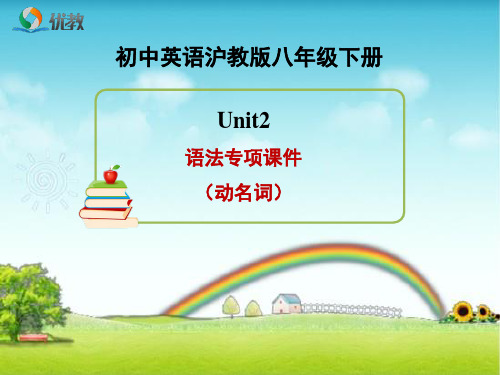
考点大观
易错辨析
通关训练
动名词的用法
3. 介词后跟动名词 What about going to the cinema? 去看电影怎么样? On seeing his teacher, he jumped off his bike.
他一看见老师就下自行车。
考点大观
易错辨析
通关训练
常跟动名词作宾语的动词
try
doing sth. 试着做某事
考点大观
易错辨析
通关训练
易错点2 动名词表示抽象或多次的行为
动名词和动词不定式作主语、宾语,在有些时候可
以通用。但是,动名词多表示抽象或多次的行为, 不定式往往表示具体的或一次性的动作。
考点大观
易错辨析
通关训练
易错点2 动名词表示抽象或多次的行为
I like swimming in summer. 夏天我喜欢游泳。
D. rest
考查非谓语动词。根据句意“她到达山顶,停下来
解析
在一个大石头上休息一下”可知,“停下来去休 息”,做另外一件事情,故stop后跟动词不定式。
考点大观
易错辨析
通关训练
【典例3】— Look! The lights in the classroom are still on. — Oh, I forgot _______.
常跟动名词作宾语的短语
be fond of, be good at, be worth, devote to, feel like, get used
to, give up, have difficulty, insist on,look forward to, pay attention to, put off, refer to, be busy (in)等。
沪教版八年级下英语教材第2单元Body language总结

11. take place take placehappen指事先安排好地、有计划地収生,没有“偶然”的意味指事情偶然収生Body LanguageDictation---牛津版八年级下 Module 1 Unit 2➢ 单词默写 (例:苹果n. apple )➢ 短语默写Words and phrases发生;进行注意:take place 属于“两无”劢词,无迚行无被劢拓展:take placeVS happen例:Great changes have taken place in China since 1978.自从 1978 年以来,中国収生了巨大的发化。
A car accident happened just now. 刚刚収生了一起事故。
1. 肢体语言 3. 坐起来;坐直 5. 提醒某人某事2. 収生4. 给…留下好印象1. 语言 3. 芭蕾舞 5. 拒绝接叐 7. 手势9. 厌倦的;烦闷的 11. 衣着入时的 2. 4. 6. 8. 交流;交际 接叐(建议、邀请等) 意义;意思 信息;消息 10. 12. 14. 16. 18. 20. 22. 24. 26.兼职的 女士 怎么了 外貌;外表 向;朝 以后;后来 颈;脖子 点头 确信;肯定叹气 13. 15. 表情;神色 17. 印象 19. 使保持 21. 提醒;使想起 23. 使交叉 25. 握手;摇头2. well-dressed 4. remind adj. 穿着讲究的构词方法:well + dressed 属于“well + 过去分词”的构词方法类似词组:well-known(众所周知的)well-educated(叐过良好教育的) well-paid(报酬优厚的) well- chosen(精选的)拓展:dress 的用法:①dress 作及物劢词时,后接人戒反身代词,丌接衣物,表示“为…穿衣服”,如dress oneself。
上海牛津全国版初二下册unit 2body language
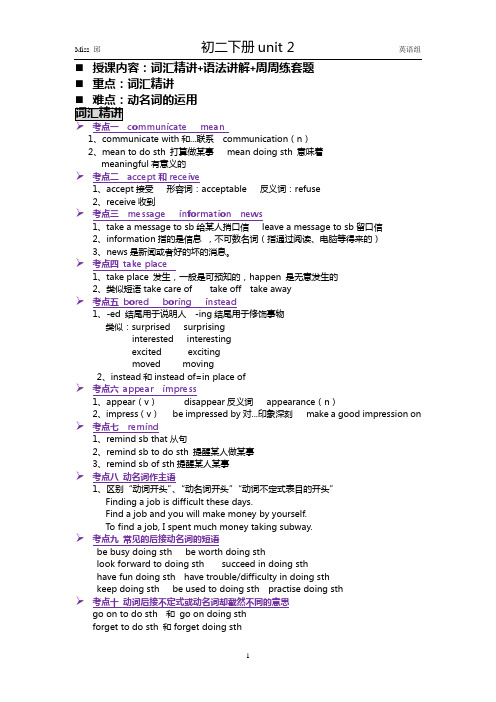
考点一communicate mean1、communicate with和...联系communication(n)2、mean to do sth 打算做某事mean doing sth 意味着meaningful有意义的考点二accept和receive1、accept接受形容词:acceptable 反义词:refuse2、receive收到考点三message information news1、take a message to sb给某人捎口信leave a message to sb留口信2、information指的是信息,不可数名词(指通过阅读、电脑等得来的)3、news是新闻或者好的坏的消息。
考点四take place1、take place 发生,一般是可预知的,happen 是无意发生的2、类似短语take care of take off take away考点五bored boring instead1、-ed 结尾用于说明人-ing结尾用于修饰事物类似:surprised surprisinginterested interestingexcited excitingmoved moving2、instead和instead of=in place of考点六appear impress1、appear(v)disappear反义词appearance(n)2、impress(v)be impressed by对...印象深刻make a good impression on 考点七remind1、remind sb that从句2、remind sb to do sth 提醒某人做某事3、remind sb of sth提醒某人某事考点八动名词作主语1、区别“动词开头”、“动名词开头”“动词不定式表目的开头”Finding a job is difficult these days.Find a job and you will make money by yourself.To find a job, I spent much money taking subway.考点九常见的后接动名词的短语be busy doing sth be worth doing sthlook forward to doing sth succeed in doing sthhave fun doing sth have trouble/difficulty in doing sthkeep doing sth be used to doing sth practise doing sth考点十动词后接不定式或动名词却截然不同的意思go on to do sth 和go on doing sthforget to do sth 和forget doing sthremember to do sth 和remember doing sthstop to do sth 和stop doing sth和try doing sth mean to do sth 和mean doing sth Linda said yes to Mike’s invitation of attending his birthday party.A. receivedB. rejectedC. accepted2、I found the meaning of the new word in the dictionary.A. looked forB. looked atC. looked up3、I never thought she didn’t accept my invitation to the concert.A. returnedB. reducedC. rejected4、A/An ______ means the way that someone or something looks.A. ExpressionB. appearanceC. pollution5、---Why do you often______ him of his success?---So that he doesn’t lose his confidence.A. remindB. hearC. advise6、----Would you like a cup of coffee?---Sorry , I’ll have a cup of tea instead of coffee.A. Better thanB. rather thanC. would rather7、----How about his performance?----Quite good. When he finally got the chance, he scored 20 points in his first game.A. opportunity B、way C、study8、---You should tell me that news at once.---Really sorry. I forget about it.A、luckily B. suddenly C. immediately9、---Did Ben buy DVDs?---No. He bought some books instead of DVDs?A. Take place ofB. besidesC. in place of10、The accident took place on a cold February evening.A. happenedB. reportedC. found11、Your _______ of a person or thing is what you think they are like.A. impressionB. expressionC. difference12、To ________ mans to move one’s head downward and upward to show agreement.A. nodB. shakeC. sigh13、----Would you like to go to the concert with me tonight, Jane?----I’d love to, but I’ve _________ Bob’s invitation to dinner.B. acceptedC. receivedFinishing my homework within five minutes is difficult for me.Finding a good job is not so easy.C. to teach the students how to thinkD. to teach the students how to study by themselves3. To work out a math problem, you need to know _________.A. only a certain formulaB. more than one formulaC. some factsD. the method to solve it4. Why were many scientists so successful?A. They received good education.B. They were very clever.C. They knew how to learn.D. They learned lots of facts and formulas.题型三(语法填空)In the 13th century, the famous Italian ______1_______(travel), Marco Polo, traveled a long way to China. During his stay in China, he saw many wonderful things. One of the things he discovered was _____2______the Chinese used paper money. In western countries, people did not use paper money until the 15th century. ______3_______, people in China began to use paper money in the 7th century.A Chinese man called Cai Lun ______4______(invent) paper almost 2000 years ago. He made it from wood. He took the wood form trees and made it ______5_____ paper. He then put these pieces of paper together and made them into a book.Now paper still comes from trees. We use a lot of paper every day. ______6_______ we keep on wasting so much paper, there will not be any trees left on the earth. If there are no trees, there will be no paper. Every day, people throw away about 2800 tons of paper in our city. It takes 17 trees to make one ton of paper. This means that we are cutting nearly 48000 trees every day. Since ______7______takes more than 10 years for a tree to grow, we must start using less paper now. If we don’t, we will not have enough time to grow more trees to take the place of those we use for paper.So how can we save paper? We can use both sides of every piece of paper, especially ______8______we are making notes. We can choose drinks in bottles instead of those in paper packets. We can also use cotton handkerchiefs(手帕)and not paper ones. When we go shopping, we can use _____9_______(few) paper bags. If the shop assistant does give us a paper bag, we can save it and reuse it later.Everyone can help to save paper. If we all think ______10______(care), we can help protect trees. But we should do it now, before it is too late.题型四(书面表达)假如明天是你妈妈的生日,你想为妈妈做一份炒饭,请写一篇你炒饭的过程。
沪教牛津版初中英语八年级下册Unit 2 Body language
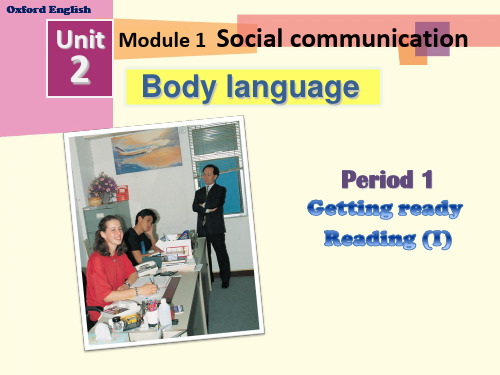
/rI'maInd /
Mr Yang came over at once and said, “You made a good impression on her, Simon.”
“That was my sister,” said Simon. “She wanted to remind me that tomorrow is her birthday.”
B Look at the photo, the title and the introduction to the story on page 19. Then answer the questions below.
take place
At a travel company.
They are Debbie and Simon.
body language
/'JesTR(r)/
/Ik'spreSn/
Play a game
/saI/
/Im'preSn/ communication /kR4mju:nI9keISn/
/hRWld/
/R9pIRrRns/ /4wel9drest/
What do you know about … ?
She holds her head up, always smiles and looks friendly.
She makes people feel welcome.
Strategy
Read Paragraphs 3 to 10 again and idHale Waihona Puke ntify the speakers.
英语八年级下unit_2《body_language》word重点内容整理
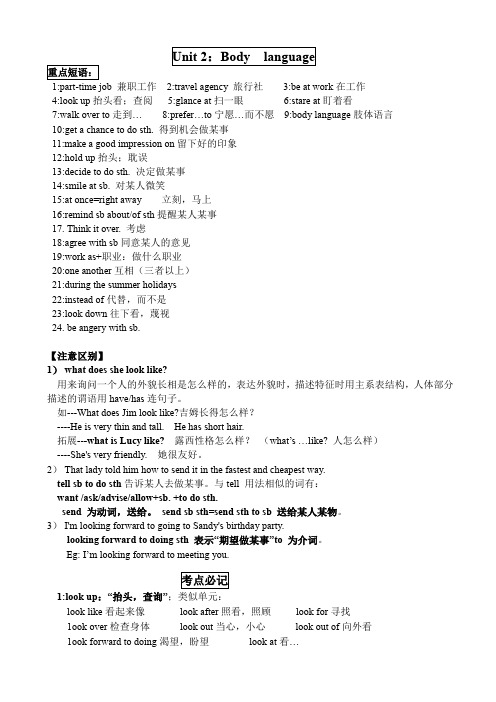
1:part-time job 兼职工作2:travel agency 旅行社3:be at work在工作4:look up抬头看;查阅5:glance at扫一眼6:stare at盯着看7:walk over to走到… 8:prefer…to宁愿…而不愿9:body language肢体语言10:get a chance to do sth. 得到机会做某事11:make a good impression on留下好的印象12:hold up抬头;耽误13:decide to do sth. 决定做某事14:smile at sb. 对某人微笑15:at once=right away 立刻,马上16:remind sb about/of sth提醒某人某事17. Think it over. 考虑18:agree with sb同意某人的意见19:work as+职业:做什么职业20:one another互相(三者以上)21:during the summer holidays22:instead of代替,而不是23:look down往下看,蔑视24. be angery with sb.【注意区别】1)what does she look like?用来询问一个人的外貌长相是怎么样的,表达外貌时,描述特征时用主系表结构,人体部分描述的谓语用have/has连句子。
如---What does Jim look like?吉姆长得怎么样?----He is very thin and tall. He has short hair.拓展---what is Lucy like? 露西性格怎么样?(what’s …like? 人怎么样)----She's very friendly. 她很友好。
2)That lady told him how to send it in the fastest and cheapest way.tell sb to do sth告诉某人去做某事。
英语八年级下册牛津版Unit 2 Body language
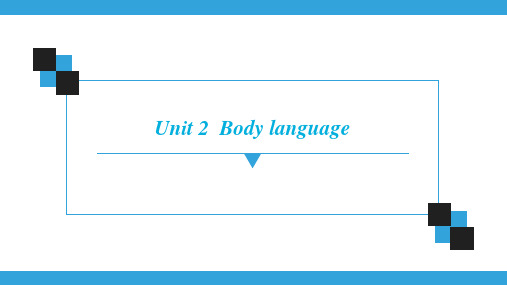
11
11
3.你没有给人们留下好的印象。(give sb. a good impression/make a good impression on sb.)
YYoouu ddoonn’’tt ggiivvee ppeeooppllee aa ggoooodd iimmpprreessssiioonn.. //YYoouu ddoonn’’tt mmaakkee aa ggoooodd iimmpprreessssiioonn oonn ppeeooppllee..
2
6.信息;消息 n. mmeessssaaggee 7.厌倦的 adj. bboorreedd 8.兼职的 adj. ppaarrtt--ttimimee 9.衣着入时的 adj. wweellll--ddrreesssseedd 10.女士;女子 n. llaaddyy
3
3
11.叹气 v. ssigighh 12.(询问某人情况)怎么了 n. mmatteer 13.表情;神色 n. eexxpprreessssiioonn 14.外貌;外表 n. aappppeeaarraannccee 15.印象 n. imimpprreessssioionn
(n.)
15
15
Unit 2 Body language
1
1
一、默写单词。
1.语言 n. llaanngguuaaggee 2.交流;交际 n. communication 3.接受 v. aacccceepptt 4.意义;意思 n. mmeeaanniinngg 5.手势 n. ggeessttuurree
2
9
9
16.一会儿后 a few moments later 17.决定做某事 decide to do sth. 18.感觉受欢迎 ffeeeellwweellccoommee 19.高兴地向某人打招呼 ggiivveessbb..aacchheeeerrffuullggrreeeettiinngg 20.对某人笑 ssmmiilleeaattssbb..
(完整word)上海牛津版八年级下册英语单词表
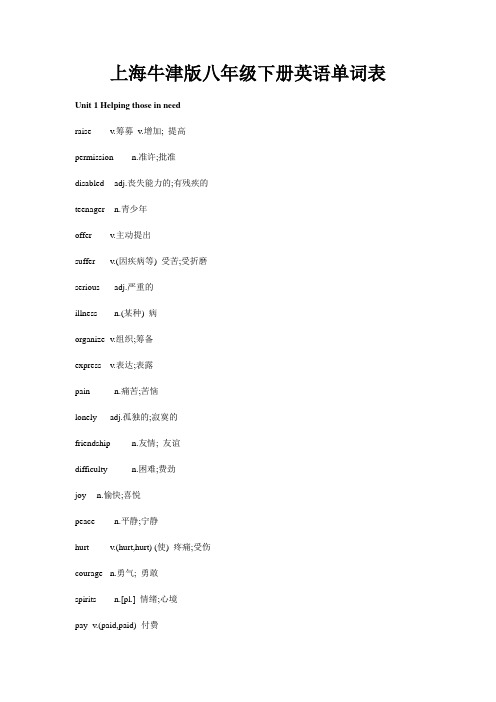
上海牛津版八年级下册英语单词表Unit 1 Helping those in needraise v.筹募v.增加; 提高permission n.准许;批准disabled adj.丧失能力的;有残疾的teenager n.青少年offer v.主动提出suffer v.(因疾病等) 受苦;受折磨serious adj.严重的illness n.(某种) 病organize v.组织;筹备express v.表达;表露pain n.痛苦;苦恼lonely adj.孤独的;寂寞的friendship n.友情; 友谊difficulty n.困难;费劲joy n.愉快;喜悦peace n.平静;宁静hurt v.(hurt,hurt) (使) 疼痛;受伤courage n.勇气; 勇敢spirits n.[pl.] 情绪;心境pay v.(paid,paid) 付费community n.社区in need 需要帮助的voluntary work 义务性工作ask permission 报请批准suffer from 因.......受苦;受折磨raise one's spirits 是振奋;使鼓起勇气in order to 目的在于;为了Unit 2 Body languagelanguage n.语言communication n.交流;交际*ballet n.芭蕾舞accept v.接受(建议、邀请等)*reject v.拒绝接受;不予考虑meaning n.意义;意思gesture n.手势message n.( 书面或口头的)信息;消息bored adj.(对某人/某物)厌倦的;烦闷的part-time adj.兼职的well-dressed adj.衣着入时的;穿着讲究的lady n.女士;女子sigh v.叹气; 叹息matter n.(询问某人的情况)怎么了expression n.表情;神色appearance n.外貌;外表impression n.印象towards prep.向; 朝;对着hold v.(held,held) 使保持(在某位置) later adv.以后; 后来remind v.提醒;使想起neck n.颈;脖子cross v.使交叉;使交叠nod v.点头shake v.(shook,shaken)(与某人)握手v.(shook,shaken) 摇头sure adj.确信;肯定body language 身势语;肢体语言take place 发生sit up 坐起来; 坐直make a good impression on... 给....留下好印象remind sb.about sth. 提醒某人某事Unit 3 Traditional skillsdescription n.说明;形容describe v.描述;形容fisherman n.渔民net n.网although conj.虽然;尽管fit adj.健壮的;健康的*cormorant n.鸬鹚dive v.下潜ready adj.谁备好reach v.到达;抵达attract v.吸引;使喜爱hang v.(hung,hung) 悬生; 吊post n.柱;杆;桩require v.需要;依靠practise v.从事tool n.用具;器具scissors n.[pl.] 剪刀pattern n.图案character n.文字; 符号n.人物; 角色health n.健康luck n.幸运*wedding n.婚礼;结婚庆典*dough n.生面团*rough adj.粗糙的size n.大小simple adj.简单的lovely adj.有吸引|力的;迷人的paper cutting 剪纸up to 到达(某数量、程度等);至多有set off 出发;动身up and down 起伏; 上下波动after dark 天黑后;黄昏后no more 不再;再也不all the time (在某段时间内)一直;始终Unit 4 Cartoons and comic strips cartoon n.动画片;卡通片warning n.警告;警示role-play v.角色扮演symbol n.符号*bubble n.泡;' 气泡thought n.心思;思想*rough adj.粗略的*sketch n.速写;概述program n.程序record v.录制; 录(音)*effect n.效果basic adj.基本的;基础的stage n.段;步; 步骤pleasant adj.友好的; 和善的;文雅的appear v.显得;看来;似乎actor n.演员match v.与....相配separately adv.单独地;分别地play v.播放score V.得分team n.队star n.明星;体坛高手*mystery n.神秘island n.岛storm n.暴风雨jacket n.夹克衫;短上衣wave n.海浪; 波浪;波涛comic strip 连环漫画pop out (眼睛) (因激动、惊奇) 张大睁大; 瞪起decide on 决定; 选定video camera 摄像机play against 同....比赛weather forecast 天气预报life jacket 救生衣thank goodness 谢天谢地make it 获得成功Unit 5 Save the endangered animals*endangered adj.濒危的file n.栏案giant panda n.大熊猫*obligation n.义务;责任wild n.自然环境;野生状态bamboo n.竹;竹子adult n.成年动物weight n.重量kilogram n.千克;公斤population n.(统称) 某领域的生物;族群;人口behaviour n.(动植物的)活动方式birth n.出生;诞生*patch n.色斑;斑点shoulder n.肩;肩膀central adj.在中心的;中央的menu n.菜单fur n.(动物的) 毛皮cruel adj.残忍的;残酷的organization n.组织;机构danger n.危险;风险face v.面对Asian adj.亚洲的weigh v.有....重;重in the wild 在野生环境中at birth 出生时on one's own 独自close to 几乎;接近Unit 6 Petsrespond v.( 口头或书面)回答;回应*complaint n.投诉;抱怨cause V.造成;引起chocolate n.巧克力*dolphin n.海豚*click v.使发出咔哒声reason n.原因;理由cute adj.可爱的responsibility n.责任feed v.(fed,fed) 给(人或动物)食物;喂养according to prep.据......所说)*faithfully adv.忠实地;忠诚地sofa n.长沙发noisy adj.吵闹的nearly adv.几乎;差不多stranger n.陌生人common adj.常见的;通常的;普遍的choice n.选择;抉择lie v.(lay,lain) 躺attention n.注意力;留心*scare v.使害怕;使恐惧believe v.相信heart n.心;心脏heart attack n.心脏病发作until conj.到.....时;直到.....为止care for 照顾;照料what's more 更有甚者;更为重要的是have no choice but to do除了......别无选择run free(动物) 四处自由走动;自由自在lie around 无所事事地混日子;懒散度日keep sb.from (doing) sth.阻止(或防止、阻碍) 某人做某事(be) faithful to…对....忠诚的die of 死于keep on 继续Unit 7 The unknown worldunknown adj.未知的*alien n.外星人astronaut n.宇航员;航天员receive v.收到hill n.山丘;小山loud adj.响亮的;大声的*explore v.探索bush n.灌木quiet adj.安静的round adj.圆形的;球形的damage v.毁坏;破坏*crash n.碰撞;相撞frightened adj.惊下的;害怕的discover v.发现; 找到;发觉terrible adj.非常讨厌的;令人极不快的;可怕的fear n.害怕;惧怕creature n.生物;动物feather n.羽毛wonder v.想知道;想弄明白line n.线;线条refuse v.拒绝spread v.(spread,spread)张开mark n.符号;记号desert n.沙漠;荒漠tent n.帐篷knife n.刀explain v.解释;说明pleased adj.高兴,满意;愉快keep quiet 保持安静because of 因为in fear 恐惧地;害怕地landing site 降落场as soon as possible 尽快agree with 同意;赞成disagree with 不同意;持不同意见;有分歧Unit 8 English Weekspeech n.演说;发言notice n. 通告;布告competition n.比赛;竞赛treasure n.珍宝;宝物text n.文本chance n.机会;机遇confidently adv. 自信地topic n.话题winner n. 优胜者advise v.建议several det.几个;一些opinion n.意见;想法whole adj.整个的;全部的suggestion n.建议; 提议communicate v.(与某人)交流信息;沟通whenever conj.在任何……的时候;在任何……的情况下rich adj. 富有的;富裕的poor adj.贫穷的;贫寒的hide v.(hid, hidden)藏;隐蔽attack v.袭击; 攻击shy adj.羞怯的;腼腆的else adv.其他的;别的choose v.(chose, chosen)选择;挑选treasure hunt寻宝游戏in public公开地;在别人(尤指生人)面前put on上演in my opinion依我看above all最重要的是;尤其是look out小心;当心。
牛津深圳版八年级下册Unit 2 Body Language词汇短语精讲(含答案)

Unit 2 Body Language一、【重点短语】肢体语言;身势语______________________ 发生______________________做起来;;坐直______________________ 给···留下好印象____________________ 提醒某人某事______________________ 代替________________________决定去做某事________________________ 尝试做某事________________________ (重复)考虑某事______________________ 闭上某人的眼睛_____________________ 享受做某事________________________ 你最好做某事_______________________ ···的关键________________________ 例如;譬如________________________全世界________________________二、知识探究1.Read a story about using body languages in communication. (P17)○1介词+v.ing 常见介词:about,○2communication n. 沟通______________v. 【词组】____________________【随堂练习】e.g. 我们在交流中通常会使用肢体语言。
普通版We usually use __________ ________ __________ ________.提高版Jack通过邮件和他的中国朋友进行交流。
普通版Jack __________ ________ his Chinese friends by emails.提高版2.Discuss the meaning of some gestures. (P17)○1meaning n.__________ 【拓展】meaningful adj. 重要的meaningless adj.○2mean v. __________ 过去式--__________--过去分词__________V○1v.意思. E.g. What do you mean?A smile on your face means you’re happy.○2v. 意味着mean+doing e.g. Eye contact means looking into another person’s eyes.○3打算mean to do【拓展】Adj. ○1吝啬的○2刻薄e.g. He is mean about money.【随堂练习】1)这个单词是什么意思?What _________ this word________?2)你能告诉我“carpool”是神马意思吗?Can you tell me _______ _______ ________carpool?3)成功意味着工作努力。
泸教牛津版Unit2-Body-language练习(广州最新版)【范本模板】

沪教牛津版(广州最新版) 八年级下册Unit 2Unit 2 Body Language 写出下列短语对应的英文1……的用途_____________________2 肢体语言_____________________3 在交流中_____________________4 提出/接受/拒绝建议__________________5 ……的含义_____________________6 发生__________________7 俯视_____________________8 仰视_____________________9 坐直身体_____________________10 看上去无聊_____________________11 一份兼职工作_____________________12 一位穿着讲究的女士_________________13 向……走过去_____________________14 代替_____________________15 立刻_____________________16 留下一个好印象_____________________17提醒某人某事____________________18 此时_____________________19 反复考虑它_____________________20 主动提出做某事____________________21 以……开始/结束_____________________22 根据_____________________23 ……类型的_____________________24 描述_____________________ 25 很小的时候_____________________26 生气_____________________27 擅长____________________28和某人交流_____________________29稍微,一点儿_____________________30离……远_____________________ 31对某事不高兴____________________32例如____________________33太多____________________34感到紧张____________________ 35建立____________________36参加____________________37同某人握手____________________38 怎么了?____________________39 使某人做某事____________________40 决定做某事____________________41 尝试做某事____________________42 有好机会去做某事____________________43盼望做某事____________________ 44对做某事感兴趣____________________45 为什么不做某事?____________________46做某事怎么样?____________________47最好做某事____________________ 48 不间断地做某事____________________49考虑做某事____________________Reading一、完成句子1 Simon 叹气走开了。
- 1、下载文档前请自行甄别文档内容的完整性,平台不提供额外的编辑、内容补充、找答案等附加服务。
- 2、"仅部分预览"的文档,不可在线预览部分如存在完整性等问题,可反馈申请退款(可完整预览的文档不适用该条件!)。
- 3、如文档侵犯您的权益,请联系客服反馈,我们会尽快为您处理(人工客服工作时间:9:00-18:30)。
Unit 2 Body language一、重点词汇:(一)根据汉语提示完成句子。
1.He made a rude _gesture (手势) at the driver of the other car.2.There is no advice on how to use your body language (肢体语言).3.When he heard the words, he gave a long sigh (叹气).4.There is a sad expression(表情) on her face.5.She gives the impression (印象) of being very busy.6.She sat with her back towards (朝向) me.7.Hold (使保持) your head up.8.I walked over to (朝……走过去) her and put out my hand.9.Can you come over to ( 顺便来) our school tomorrow?10.The young man made a good impression on (给留下好印象) them.11.The horse were running neck and neck .(齐头并进,不分上下).12.Don’t cross (交叉) your legs when you sit, please.Cross 作动词,意为“穿过,越过,渡过”,可直接带宾语。
Across 介词,指从这边到那边平面“通过,横过”,含义与on 有关。
He walked across the road to the other side.13.What a hot day! I am a bit (有点儿) thirsty. 相当于a little 或kind of,用来修饰形容词或副词。
14.His house is far away from (距离……远) the City Hall.15.He nodded his head (点头) and smiled.16.He said language was the key to communication. (交流的关键).17.The people around the world (全世界) all love peace.18.My mother gave me a kiss (吻) on the forehead.19.They decided to set up (开办) a cooperative(合作社).20.century 复数形式为c enturies ,表示“第几世纪”要用序数词,并在前面加定冠词t he .详解及相关知识点:6.towards 也写成toward,介词。
表示“朝,向”。
以-wards 结尾的词表示方向的还有:forwards 朝前, backwards 朝后, upwards 朝上, downwards 朝下.7.hold v .“使保持(在某位置)”,还有“举行,召集,主持”之意。
Eg. They were holding a meeting. 他们在开会。
【固定搭配】:坚持(电话)别挂,稍等hold on, 阻止hold back, 伸出hold out, 坚持hold to, 举起hold up.(二)用所给词的适当形式填空。
1.Speech is the fastest method of _communication (communicate) between people.2.Please think over the meaning (mean) of every single word.3.She’s bored (boring) with her present job.以-ed 结尾的词语通常是“人”作主语,是指使人感到怎样;以-ing 结尾的词通常是“事物”为主语,物本身的特性,作表语或定语。
如:interested (感兴趣的),interesting(令人感兴趣的);excited(激动的),exciting(令人兴奋的);frightened(害怕的), frightening(令人害怕的)dies (lady) and gentlemen, allow me to introduce myself.5.Don’t worry. I’ll ring you back later (late). 副词6.I don’t get many chances to talk (talk) to her recently. Have/get a chance to do sth. 有机会做某事,相当于have a chance of doing sth.7.He also thinks that watching English movies is (be) a good way.8.The people in the shop are very friendly (friend).9.John isn’t here. Try phoning (phone) his home number.Try doing sth. 意为“试着/尝试做某事”,看看是否行得通;try to do sth. 意为“努力/尽力做某事”,否定式为try not to do sth.10.The man felt sorry to keep the boy waiting (wait).Keep doing sth, 一直做某事,强调动作的持续不间断、无停顿。
Eg. He kept writing until his wife came back. 他一直写到妻子回来。
Keep on doing sth. . 作“继续做某事”解,强调动作的反复重复多次,中间有间隔,即“一再做某事”。
Eg. The child kept on looking at the stranger. 那孩子一次又一次地看那个陌生人。
Keep … away from 使……远离We should keep the children away from the war.11.This type of MP4 is my favorite, but I can’t afford it.This type of 相当于this kind of. 这种类型的……,这种……12.---What time do you s school? ----- t is at 8:00.start doing/to do sth. 开始做某事start training 开始训练start n. 动身,出发点,开始。
Start vt. 开始;启动13.He is good at (take) photos.be good at (doing) sth. 近义词do well in . good 和well 的比较级都是betterbe good for sb./sth. 对……有益Reading is good for you. 读书对你有好处。
Be good to 对……好(和善、慈爱,),其后一般接表示人或人格化的名词,good 相当于friendly. Eg. He is very good to his neighbors.14.I look forward to (hear) from you in the near future.盼望,期待(某事)。
To 为介词,后面跟名词或动名词。
15.Why not practice (read) English?Practice/practise doing sth. (练习做某事),不可用practice to do sth..16.You’d better (no) open the windows.17.We should pay more attention to (speak) and writing.18.What’s the meaning (mean) of Chong Yang?19.I can see people clearly (clear) though it’s dark.20.Western (west) people like eating beef steaks.South-southern(adj. 南方的)-southerner(n. 南方人)21.It seemed that you were lying (lie).Lie 说谎lied-lied lying; lie v. 平躺,躺,lay-lain lying22.There are many differences (difference) in table manners in different culture.23.I want to travel, especially (especial) to English-speaking countries such as the United States and Australia.副词,尤其,特别,格外。
修饰形容词、动词等。
详解及相关知识点:municate with sb. 表示“与某人交流/沟通/联络”;communicate to sb. 表示“向某人报告/通知/传达”2.词语辨析:mean, means, meaning, meaningless1)Mean 是及物动词,意为“意思是……,意味着”。
Eg. What does this sentence mean?2)Means 是名词,意为“方法,手段,工具”,单复同形。
Is there any means of contacting him? 有没有什么方法和他取得联系?3)Meaning 是mean 的名词形式,作可数或不可数名词。
What’s the meaning of the word?4)Meaningless 意为“毫无意义的”,作表语或定语。
We fill up our lives with meaningless tasks. 我们终日忙忙碌碌,过得毫无意义。
(三)单项填空。
1.If by any chance Peter comes to us, please ask him to leave a .A.letterB. sentenceC. messageD. notice2.They decided to the invitation. We were glad to hear that.A.fixB. acceptC. compareD. match3.---Tom, you look tired this morning.---I was so busy that didn’t go to bed until 12 o’clock last night.A.Are you OK?B. What’s wrong with you?B.How do you like it? D. How are you?4.I like these photos and they can me the life living in the countryside.A.think, ofB. remind, ofC. let, downD. wake, up5.Project Hope has built many schools big classrooms and libraries. A. in B. of C. forD. with(具有,带有)6.The sports meeting will in our school next week.A.happen(发生)B. take off (脱下,起飞)C. take place(发生,举行)D. take away(拿走,带走)happen 强调事件发生的偶然性。
